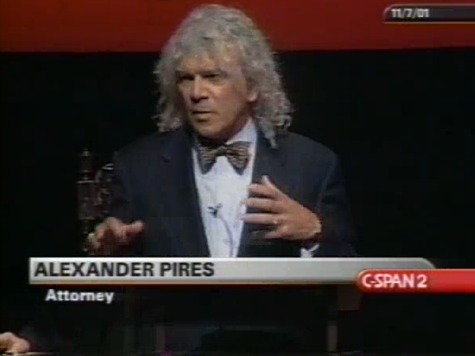
In a 2001 debate on the issue of slavery reparations, Al Pires–one of the lead attorneys behind the Pigford black farmers settlement–referred to the settlement “mini-reparations” and described the reparations “‘dream team’ he was part of,” which included one of President Barack Obama’s most important law school mentors.
The video from the November 2001 “Big Debate on Reparations for Slavery at Boston College” is still archived on the C-SPAN website and included participants like Pires, who favored slavery reparations, and the late Christopher Hitchens, who opposed them.
In his introduction, Pires briefly described what he referred to as the “Reparations Dream Team” of lawyers and scholars that came together in 2000, and that Pires said was poised to start a legal offensive in federal courts. He listed participants, including the well-known O.J. Simpson defense attorney Johnnie Cochran, and mentioned the role of Charles Ogletree of Harvard Law School.
Ogletree was the Harvard Law School mentor of Barack and Michelle Obama and remains close to them as a friend and adviser. The connection to Ogletree is significant because of Obama’s key involvement in the black farmers’ settlements, from sponsoring the Pigford II bill that greatly expanded the number of sign-ups to extending the “attempted-to-farm” standard to women, Hispanics, and Native Americans as President.
Pires then described the black farmers’ settlements and his lead role in promoting them throughout the south. He describes America as the “biggest racist the world has ever seen.”
Pires says:
This lawsuit that we brought–which again was black and white lawyers but mostly black–was against the United States government, which I believe is the biggest racist the world has ever seen. Your own government is your worst model because people can do and hide behind the government that which they can’t hide behind when they work for companies. As a result of that case, we recovered more than a billion dollars. We got more involved in it. A lot of the farmers and the people in the south looked at this case as a mini-reparations case.
This is a revealing look into the thought process of one of the lead architects of Pigford, and it shows the motivation behind a settlement that was open to massive corruption.
Doing so wasn’t feasible with just the courts; it took legislation to reopen the case. Around the same time as the Reparations Dream Team was planning its agenda and the first Pigford settlement would begin doling out checks for $50,000 to people who had never farmed a day in their life, a young Illinois State Senator named Barack Obama was interviewed on WBEZ in Chicago and lamented how the U.S. court system did not do a good job redistributing wealth. He said that he felt legislative action was more effective for its “administrative” functions.
It would take close to a decade for President Barack Obama to put that theory into practice.

COMMENTS
Please let us know if you're having issues with commenting.